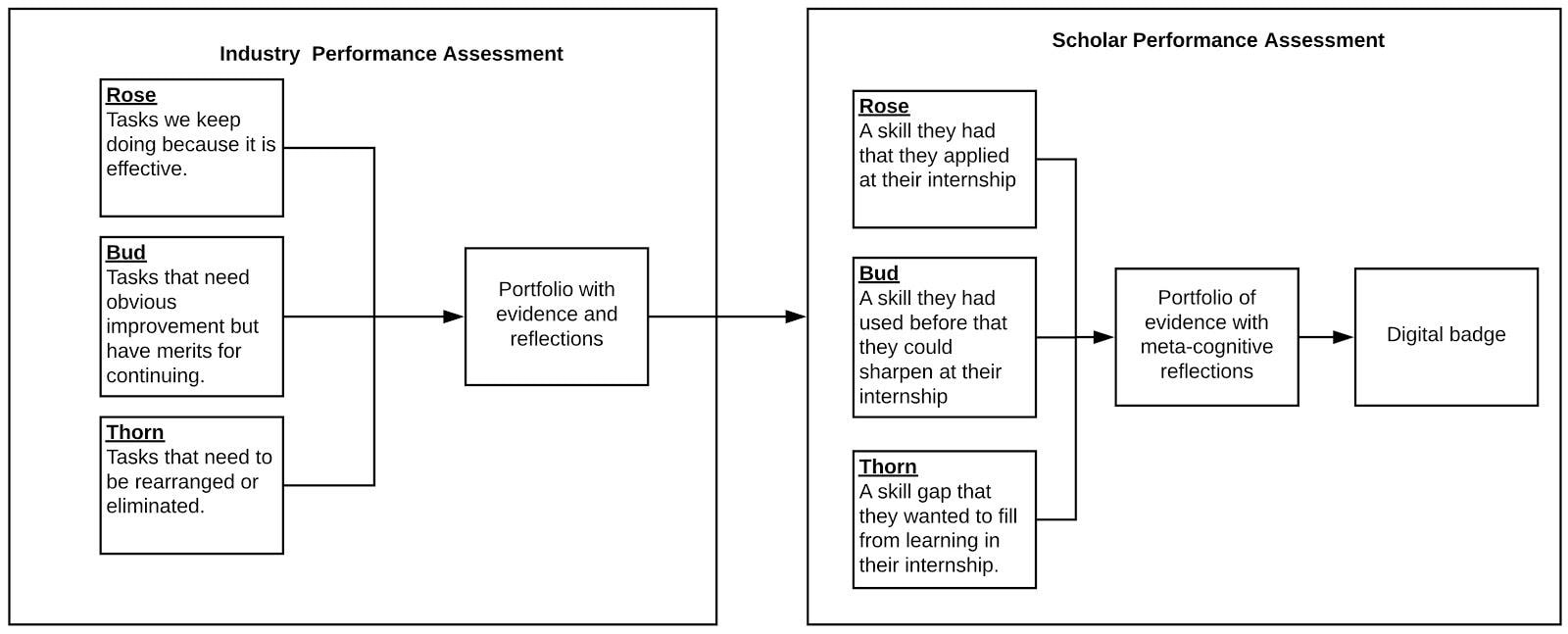|
At Del Lago Academy, we believe that learning is not bound by the walls of our school. Rich and transformative learning experiences happen at home, in the community, and at places of work. Our internship program allows scholars to leave campus and build relationships with mentors that help shape their identity and learn about the work that happens in our region. For 6 weeks each spring, scholars spend 2 days a week building skills and knowledge in places of work, such as laboratories, catering businesses, hospitals, and departments within our city government. A recent goal with this work has been to promote deeper internship experiences with more intentional skill development. As part of the Competency X project, we wondered if we could leverage our approach with ePortfolios and Digital Badges to promote skill development that was more relevant to both the scholar and their work context. We knew that some of our internships were job shadow experiences with menial tasks. Our idea was that we could have a mentor and scholar co-create a performance-based assessment to capture the skill development that was most important in that place of work. The hope was that this assessment would shift the goal setting a scholar does with their mentor. The goals would be designed around novel competencies that are needed in specific work context. Scholars would capture authentic evidence and mentor validations in a portfolio and recognize this evidence with a co-created digital badge. The digital badge would be open and accessible for others to earn and can help inform future applicants about the context specific work in an internship. We piloted this approach in 2017 and launched a second iteration this year that resulted in more authentic, open-ended, and process-oriented assessments and evidence of learning than we captured in the past. The process of co-creating a performance-based assessment began with identifying an area of growth in their internship industry and work towards innovating a solution for that area. To help them identify this growth area, we used a model of reflection, evaluation, and innovation called Roses, Buds, and Thorns, illustrated in the figure below. Model of Reflection, Evaluation, and Innovation: Roses, Buds, and Thorns: We asked scholars in their industry performance assessment to collect evidence and reflections on a Rose, a task that needed to be fostered, a Bud that needed only some minor adjustments, and a Thorn that needed to be rearranged or eliminated. Scholars collected learning evidence in a portfolio and used this to help identify their own Roses, Buds, and Thorns for skills they needed for success. Scholars then designed an assessment to capture and inform their own growth and recognize it with a digital badge.
Aisha Wallace-Palomares interned at Zero Waste San Diego, an organization dedicated to developing zero-waste initiatives. Aisha, a young woman fully dedicated to social and environmental justice, recognized their dedication to their mission and capitalized on their commitment by developing a proposal of her own: As an intern I created a proposal to create a “Sustainability Innovation Center” at the Central Library. This would ensure the ability for people across all socioeconomic levels to access resources and information relating to sustainability and environment. There would be a rooftop garden, a composting area, window farming, rain harvesting, and a demonstration area. Aisha recognized that the commitment and resources of Zero Waste San Diego was already there, as was the commitment of the Central Library to evolve into a true champion for their community. Her proposal combined the resources and commitment of both of these organizations to redesign existing space and bring a new resource to the community. Her reflections post-internship demonstrated the development of interest-based skills that really could not be taught from a podium or measured through a traditional assessment. Her proposal demonstrated strong written and spoken communication skills, collaboration and creativity, professionalism, and advocacy. Next, we gave Aisha and other scholars the opportunity to find their own Roses, Buds, and Thorns with skills they needed for this level of success in their internship. Scholars collected evidence of their learning, and then reflected on the extent to which they mastered skills that they identified as Roses, Buds, and Thorns. The evidence was captured in a portfolio and recognized by a digital badge. Below are some examples of these digital badge based performance assessments.
We learned a tremendous amount from the badges scholars created with their mentors. These badges will soon be open on our digital badge platform and serve as a recruiting tool for future internship applicants. Teachers, administrators, mentors and internship program organizers will be able to view scholar badge profiles to discover scholars who have the skills and interests that fit the requirements of a particular job/internship role or mentorship program. The scholar co-created badges can currently be found in portfolio entries, such as the ones below:
This work by scholars indicates the power that comes from youth participating in the performance assessment design process. Our learning with this work will be continually shared at Competency X. We are continually inspired by the Assessment for Learning movement that aims to help us all broaden the definition of success and create more equitable opportunities for learners to advance with goals they set for college, career, and life. OER Resources for Co-Created Badges
1 Comment
11/11/2018 06:03:57 am
You are looking me a experienced person and your quality writing service skills are so helpful for readers.I am a person who is more focused on content than anything else.
Reply
Leave a Reply. |
AuthorAlec Barron, Ed.D. Archives
June 2018
Categories |

 RSS Feed
RSS Feed